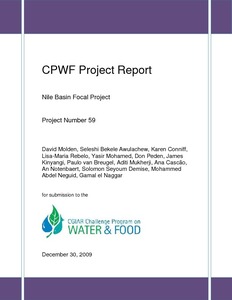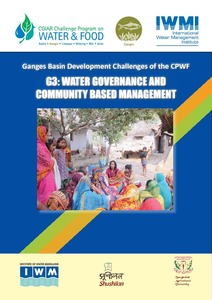No-burn agricultural zones on Honduran hillsides: Better harvests air quality and water availability by way of improved land management
On yield regulation for sustainable forestry, with examples from Queensland
Personal anecdotes are used to highlight some important considerations for yield regulation and to introduce some pertinent literature. A checklist of key issues and research needs is offered. Perhaps the most important consideration is to maintain a holistic systems view, and to involve clients and to ensure their needs are met.
Nile Basin Focal Project. Synthesis report
The Nile basin experiences wide spread poverty, lack of food and land and water
degradation. Because poverty is linked to access to water for crop, fish and
livestock based livelihoods, improving access to water and increasing agricultural
water productivity can potentially contribute substantially to poverty reduction.
The major goal of the Nile Basin Focal project is to identify high potential
investments that reduce poverty yet reverse trends in land and water
degradation. This is done through the implementation of six interlinked work
Pagos por Servicios ambientales en marcha: la experiencia en la microcuenca de chaina, Departamento de Boyacá, Colombia
En Latinoamérica se observa un creciente desarrollo de iniciativas de PSA que aunque están orientadas bajo diferentes principios y criterios, son concurrentes en la reducción de externalidades mediante el reconocimiento social y económico de los servicios ambientales. El crecimiento de esquemas de PSA en cuencas para proveer servicios hidrológicos ha sido dinámico, especialmente en las regiones andinas y mesoamericanas donde el déficit hídrico se manifiesta más fuertemente.
Participatory mapping in Lushoto district, Tanzania. A case study.
Participatory mapping in Ntcheu district, Malawi
Ordenacion de bosques naturales para la explotacion sostenible de la caoba (Swietenia macrophylla): experiencias en bosques comunales de Mexico: experiencias en bosques comunales de Mexico
In 2002, mahogany (Swietenia macrophylla) was listed on Appendix II of CITES (the Convention on International Trade in Endangered Species). This requires that all producing countries define and implement sustainable production systems for mahogany, the most commercially important neotropical timber, which is still harvested from natural forests. The only serious efforts to produce mahogany sustainably from managed natural forests are those of communities in Quintana Roo, Mexico, which control 800,000 of natural production forests.
Ostrich-like strategies in Sahelian sands?: land and water grabbing in the Office du Niger, Mali.
In recent years, large-scale agricultural investment projects have increased in sub-Saharan Africa as a result of the growing appetites of local and international investors for land resources. Research has so far mainly focused on land issues, but the water implications of these land deals are starting to surface. Taking the Office du Niger (ON), in Mali, as a case study, it is shown that while around 100,000 ha is currently being cultivated, mostly by smallholders, a total of 600,000 ha of land has been allocated in the past ten years to investors in large-scale farming.
Overcoming soil constraints in Latin American Savannas: new approaches and potential trade-offs
Overview of G3: Water Governance and Community Based Management
The International Water Management Institute is the lead institute for the Ganges Basin Development Challenge research project titled Water Governance and community-based management in coastal regions of Bangladesh. This study is one out of five research projects in the Ganges basin commissioned and funded by the CGIAR challenge Program on Food and Water inundation, salinity intrusion and severe flooding in the coastal areas is a frequent occurrence in Bangladesh. This leads to loss of life and property as well as severe impacts on livelihoods.






